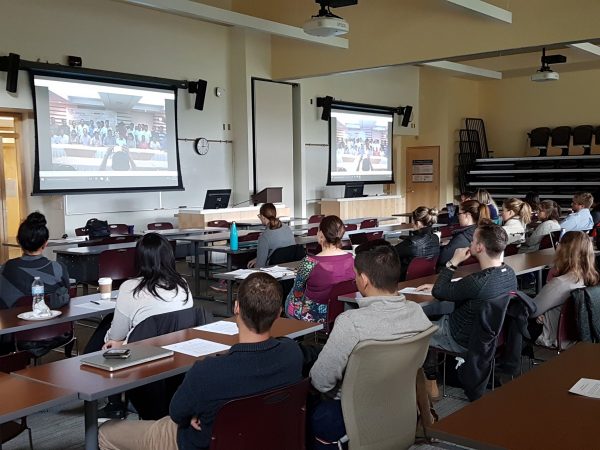Dozens of TRU Law students heard from an international guest Thursday, October 19 in a joint lecture highlighting the leadership of Indigenous women in the local and global resource justice movement.
Mariluz Canaquiri, a Latin American Indigenous leader and president of the Kukama Women’s Federation in the northern Amazon region of Peru, spoke about the impact of foreign resource extraction on her Peruvian community and strategies used to raise Indigenous, environmental and social justice concerns about proposed projects.
She was speaking to students in Indigenous Peoples in Canadian Law, Natural Resources Law and Transnational Lawyering.
Canaquiri detailed the struggles she and her community have faced in their fight with the Peruvian government for fair and proper consultation about oil pipeline projects in the area. She says the waterways, which her people use as a direct source for water and food and consider a sacred place where important river spirits live under the water, have become contaminated.
Second year student Joe Killoran says Canaquiri’s story evokes parallels to challenges our own country faces.
“Many of the same issues that affect Canadian Indigenous communities also affect Peruvian communities too,” he said, reflecting on Canaquiri’s talk.
The Kukama struggles have been captured in a documentary by Canadian independent film maker Stephanie Boyd, who has been filming Canaquiri and the Kukama people for some time. Boyd and Canaquiri are currently visiting Canada together, sharing the story and screening the film to generate awareness. Boyd is also doubling as Canaquiri’s translator as the pair share the story together.

Students watch a short version of Stephanie Boyd’s film on Mari Luz Canaquiri and the Kukama people’s struggle against resource extraction near local waterways.
“One of the reasons I wanted to come to Canada was to find allies to unite with, and work together with, to defend our planet,” Canaquiri explained.
Assistant Professor Charis Kamphuis, who spearheaded the event, says hosting Canaquiri aligns with TRU Law’s priorities.
“TRU is committed to increasing intercultural understanding and Indigenizing the institution and the curriculum. Our law school has responded to these priorities by developing experiential learning days focused on Indigenous issues,” she said.
“We are providing a legal education that trains students to become effective lawyers in a global context,” she added.
Students heard how the Kukama people and the Women’s Federation had to take to legal channels to force their government to open dialogue and consultation on the matter, which Canaquiri says ultimately did little to change the government’s plan. Feeling deceived and defeated, she said they are now taking a different legal strategy, noting they have received some help from pro bono legal organizations throughout their journey.
“The Women’s Federation is asking the federal government for their language and culture to be listed as protected national heritage. Then we can ask for protection internationally, through UNESCO. That will give us more legal weight to fight for protection of the river, as it is important to our way of life,” Canaquiri said.
For second-year student Aanchal Mogla, the visit has special meaning. Mogla conducted pro bono research last summer for the Justice and Corporate Accountability Project (JCAP; co-counded by Kamphuis), which ended up forming part of the background reading for the students as they prepared for Canaquiri’s lecture.
“Currently, there is minimal information about the Canadian oil company the Kukama people are up against. My research is meant to provide the Kukama people with a comprehensive company profile to help further their fight for justice,” explained Mogla, who was credited with finding out some new information regarding a recent name change of the company and its relocation from Vancouver to Toronto.
“We didn’t even know that,” commented Boyd.
Following the class lecture, Boyd’s film was screened at an evening public event at TRU, which included a forum and panel discussion with local women Indigenous leaders, in an effort to broaden the scope of the dialogue.

